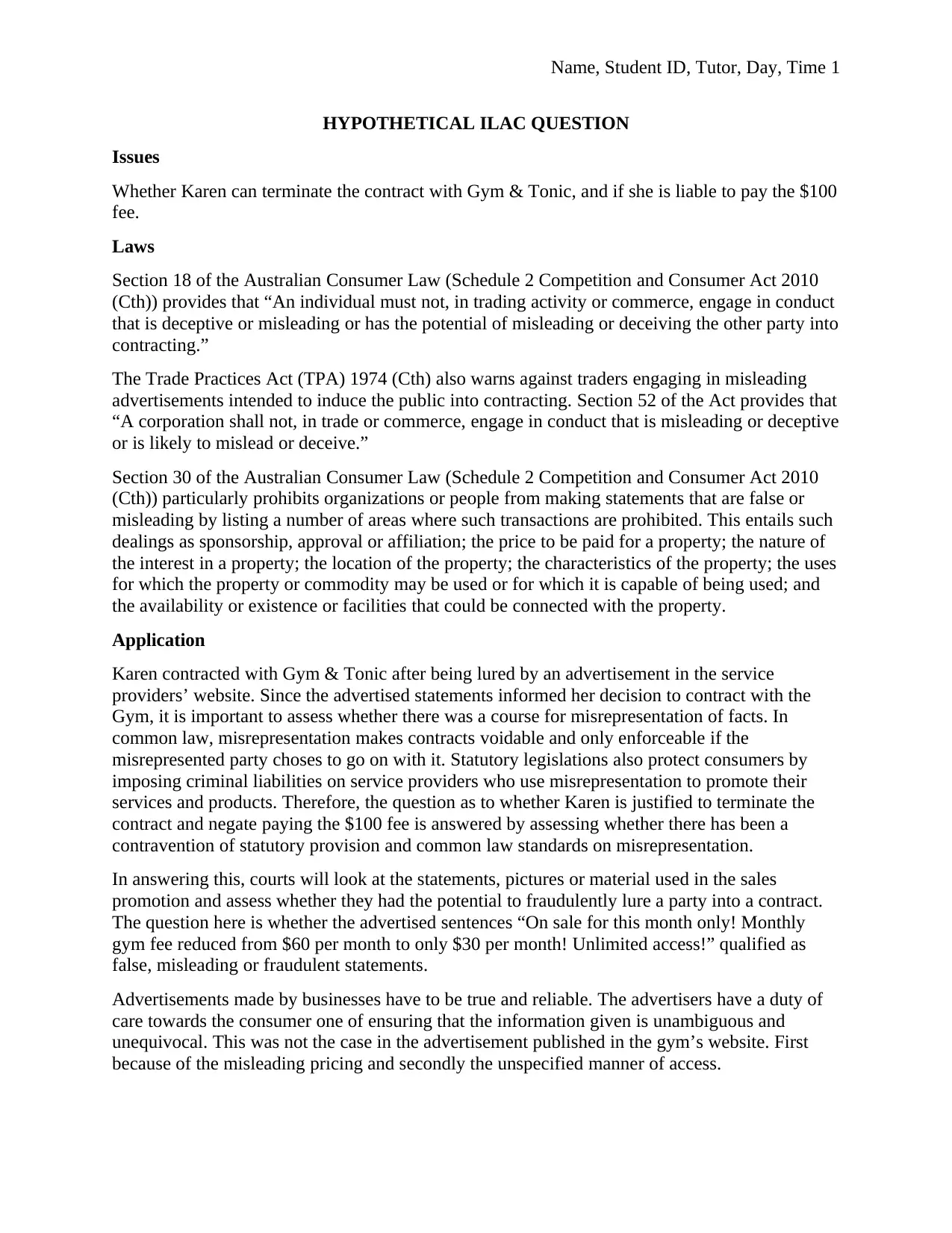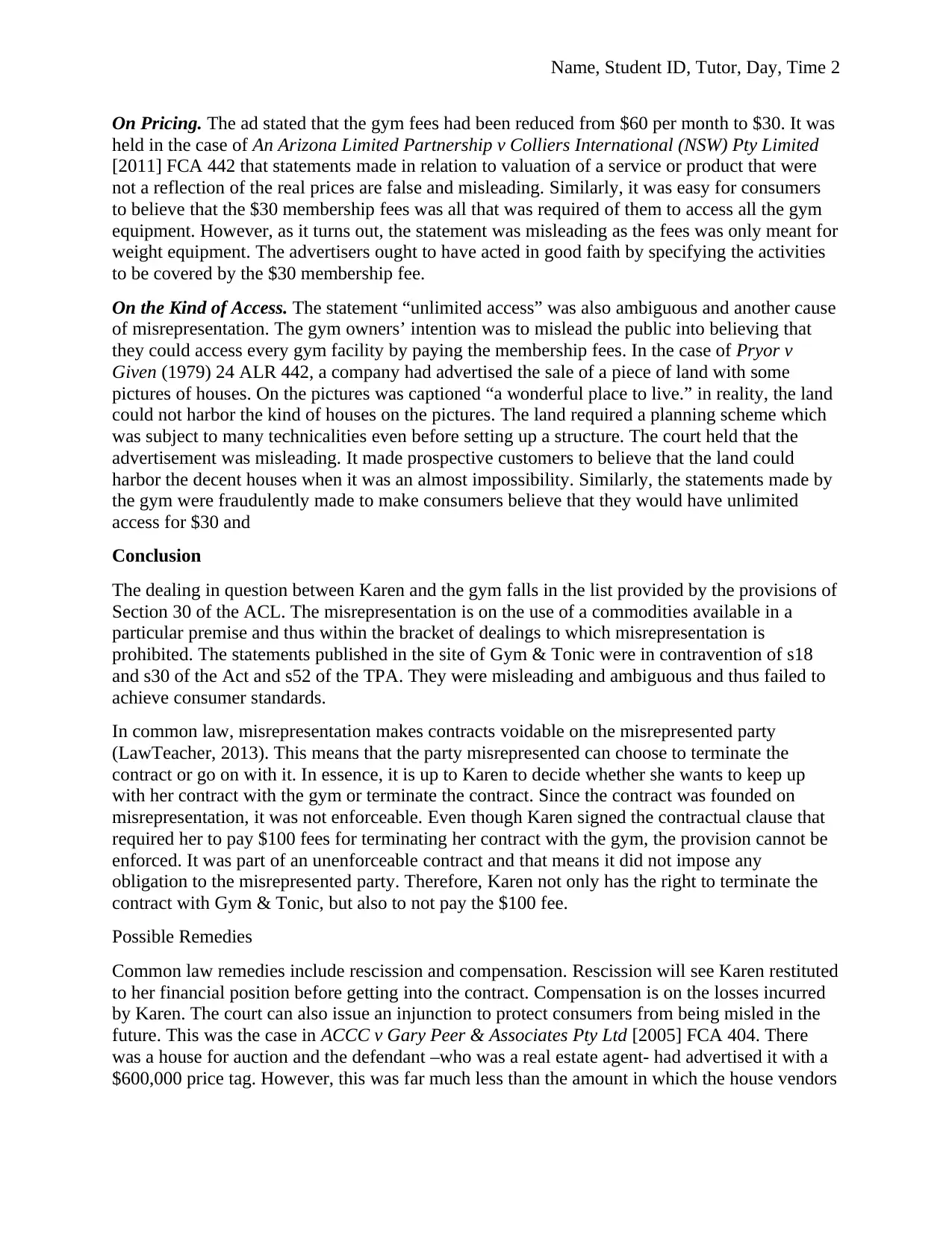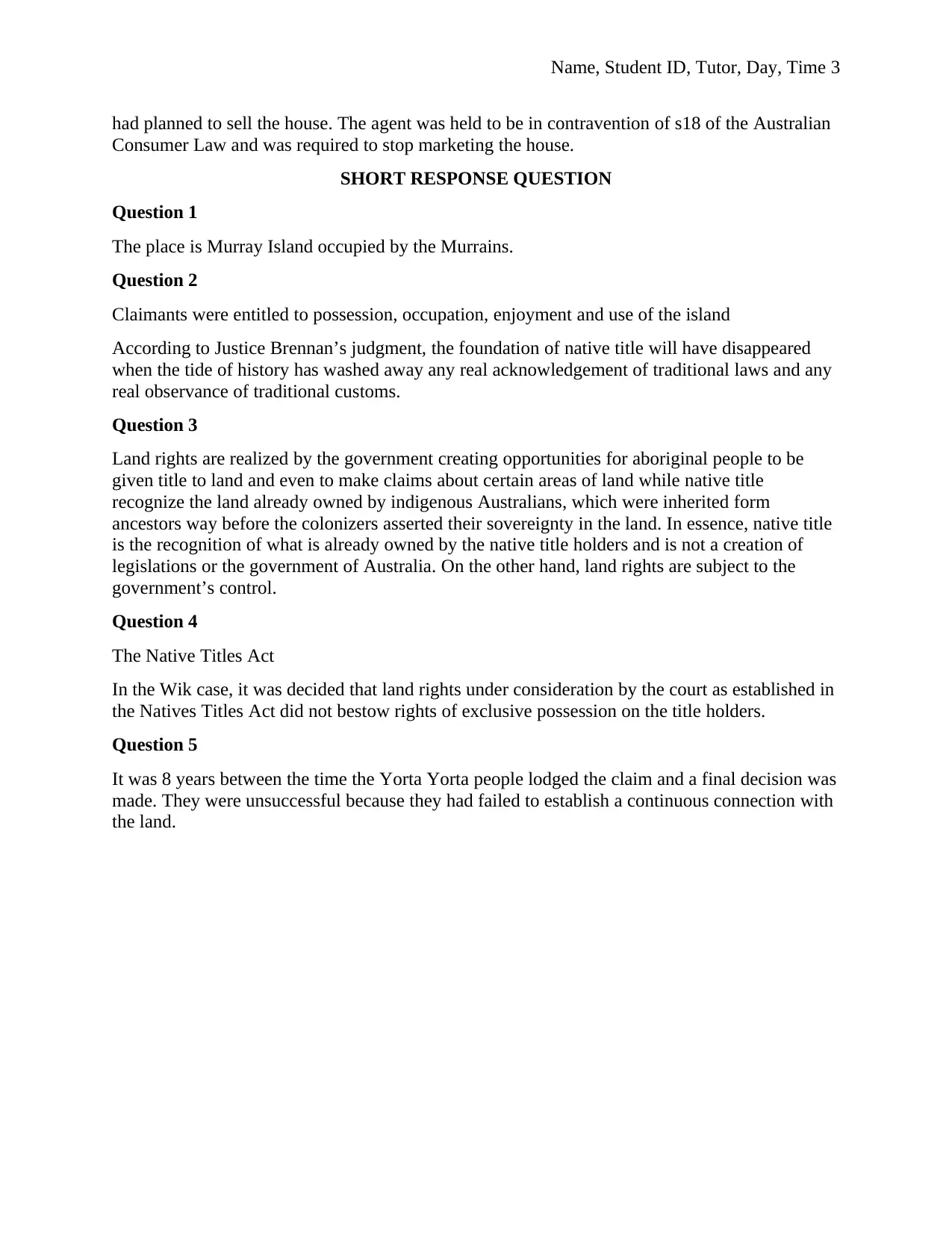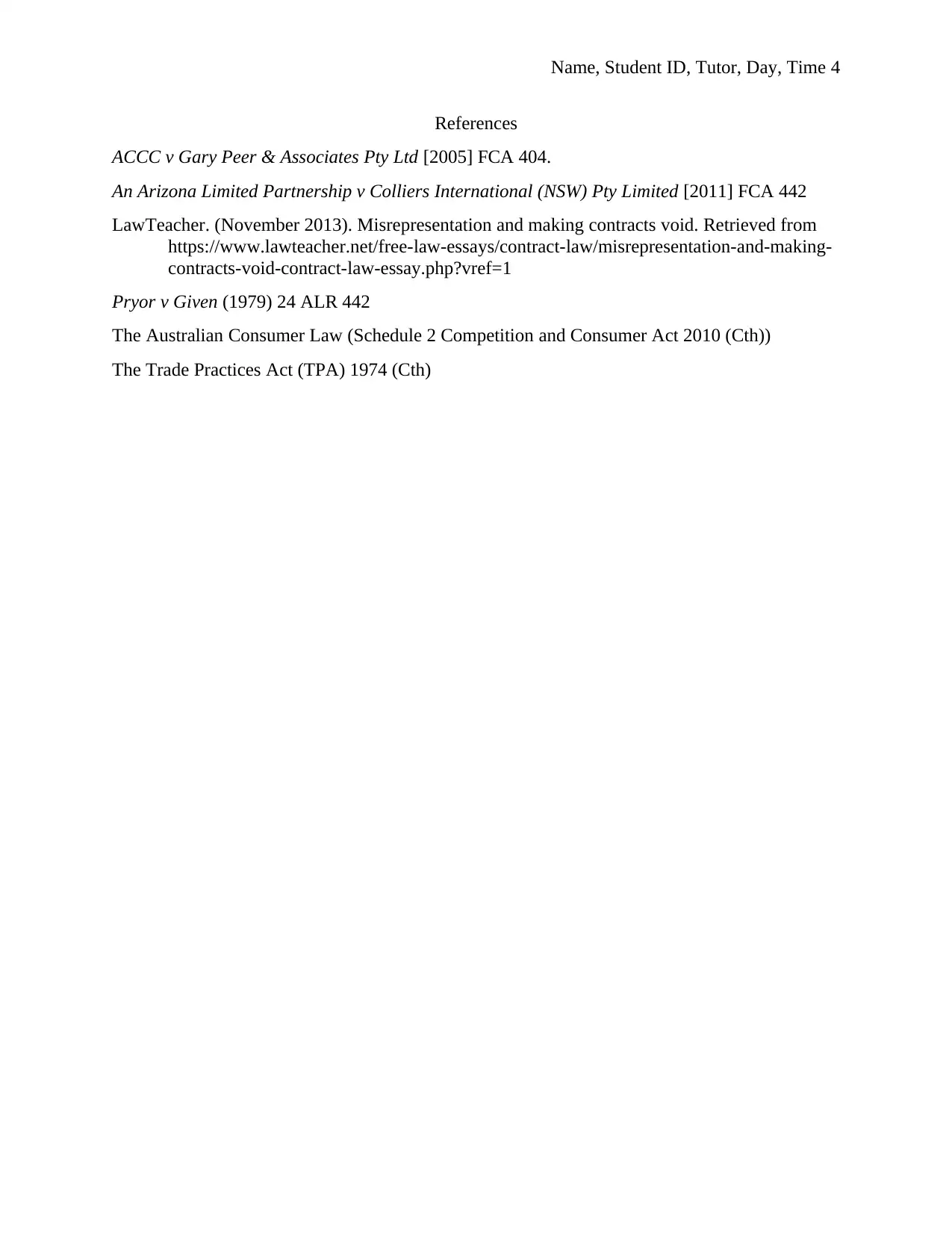2105AFE Business Law: Consumer Law, Misrepresentation and Native Title
VerifiedAdded on 2023/06/07
|4
|1637
|139
Homework Assignment
AI Summary
This assignment addresses a hypothetical ILAC question concerning consumer law, specifically focusing on misrepresentation in advertising by Gym & Tonic and its implications for Karen's contract. It analyzes whether Karen can terminate her contract without penalty due to misleading statements under the Australian Consumer Law and the Trade Practices Act. The solution applies relevant legal principles and case law to argue that the gym's advertisements were indeed misleading, entitling Karen to terminate the contract and avoid the $100 fee. Additionally, the assignment includes short response questions related to native title, discussing land rights, the Native Titles Act, and the Yorta Yorta case. This document is available on Desklib, where students can find a variety of solved assignments and study resources.

Name, Student ID, Tutor, Day, Time 1
HYPOTHETICAL ILAC QUESTION
Issues
Whether Karen can terminate the contract with Gym & Tonic, and if she is liable to pay the $100
fee.
Laws
Section 18 of the Australian Consumer Law (Schedule 2 Competition and Consumer Act 2010
(Cth)) provides that “An individual must not, in trading activity or commerce, engage in conduct
that is deceptive or misleading or has the potential of misleading or deceiving the other party into
contracting.”
The Trade Practices Act (TPA) 1974 (Cth) also warns against traders engaging in misleading
advertisements intended to induce the public into contracting. Section 52 of the Act provides that
“A corporation shall not, in trade or commerce, engage in conduct that is misleading or deceptive
or is likely to mislead or deceive.”
Section 30 of the Australian Consumer Law (Schedule 2 Competition and Consumer Act 2010
(Cth)) particularly prohibits organizations or people from making statements that are false or
misleading by listing a number of areas where such transactions are prohibited. This entails such
dealings as sponsorship, approval or affiliation; the price to be paid for a property; the nature of
the interest in a property; the location of the property; the characteristics of the property; the uses
for which the property or commodity may be used or for which it is capable of being used; and
the availability or existence or facilities that could be connected with the property.
Application
Karen contracted with Gym & Tonic after being lured by an advertisement in the service
providers’ website. Since the advertised statements informed her decision to contract with the
Gym, it is important to assess whether there was a course for misrepresentation of facts. In
common law, misrepresentation makes contracts voidable and only enforceable if the
misrepresented party choses to go on with it. Statutory legislations also protect consumers by
imposing criminal liabilities on service providers who use misrepresentation to promote their
services and products. Therefore, the question as to whether Karen is justified to terminate the
contract and negate paying the $100 fee is answered by assessing whether there has been a
contravention of statutory provision and common law standards on misrepresentation.
In answering this, courts will look at the statements, pictures or material used in the sales
promotion and assess whether they had the potential to fraudulently lure a party into a contract.
The question here is whether the advertised sentences “On sale for this month only! Monthly
gym fee reduced from $60 per month to only $30 per month! Unlimited access!” qualified as
false, misleading or fraudulent statements.
Advertisements made by businesses have to be true and reliable. The advertisers have a duty of
care towards the consumer one of ensuring that the information given is unambiguous and
unequivocal. This was not the case in the advertisement published in the gym’s website. First
because of the misleading pricing and secondly the unspecified manner of access.
HYPOTHETICAL ILAC QUESTION
Issues
Whether Karen can terminate the contract with Gym & Tonic, and if she is liable to pay the $100
fee.
Laws
Section 18 of the Australian Consumer Law (Schedule 2 Competition and Consumer Act 2010
(Cth)) provides that “An individual must not, in trading activity or commerce, engage in conduct
that is deceptive or misleading or has the potential of misleading or deceiving the other party into
contracting.”
The Trade Practices Act (TPA) 1974 (Cth) also warns against traders engaging in misleading
advertisements intended to induce the public into contracting. Section 52 of the Act provides that
“A corporation shall not, in trade or commerce, engage in conduct that is misleading or deceptive
or is likely to mislead or deceive.”
Section 30 of the Australian Consumer Law (Schedule 2 Competition and Consumer Act 2010
(Cth)) particularly prohibits organizations or people from making statements that are false or
misleading by listing a number of areas where such transactions are prohibited. This entails such
dealings as sponsorship, approval or affiliation; the price to be paid for a property; the nature of
the interest in a property; the location of the property; the characteristics of the property; the uses
for which the property or commodity may be used or for which it is capable of being used; and
the availability or existence or facilities that could be connected with the property.
Application
Karen contracted with Gym & Tonic after being lured by an advertisement in the service
providers’ website. Since the advertised statements informed her decision to contract with the
Gym, it is important to assess whether there was a course for misrepresentation of facts. In
common law, misrepresentation makes contracts voidable and only enforceable if the
misrepresented party choses to go on with it. Statutory legislations also protect consumers by
imposing criminal liabilities on service providers who use misrepresentation to promote their
services and products. Therefore, the question as to whether Karen is justified to terminate the
contract and negate paying the $100 fee is answered by assessing whether there has been a
contravention of statutory provision and common law standards on misrepresentation.
In answering this, courts will look at the statements, pictures or material used in the sales
promotion and assess whether they had the potential to fraudulently lure a party into a contract.
The question here is whether the advertised sentences “On sale for this month only! Monthly
gym fee reduced from $60 per month to only $30 per month! Unlimited access!” qualified as
false, misleading or fraudulent statements.
Advertisements made by businesses have to be true and reliable. The advertisers have a duty of
care towards the consumer one of ensuring that the information given is unambiguous and
unequivocal. This was not the case in the advertisement published in the gym’s website. First
because of the misleading pricing and secondly the unspecified manner of access.
Paraphrase This Document
Need a fresh take? Get an instant paraphrase of this document with our AI Paraphraser

Name, Student ID, Tutor, Day, Time 2
On Pricing. The ad stated that the gym fees had been reduced from $60 per month to $30. It was
held in the case of An Arizona Limited Partnership v Colliers International (NSW) Pty Limited
[2011] FCA 442 that statements made in relation to valuation of a service or product that were
not a reflection of the real prices are false and misleading. Similarly, it was easy for consumers
to believe that the $30 membership fees was all that was required of them to access all the gym
equipment. However, as it turns out, the statement was misleading as the fees was only meant for
weight equipment. The advertisers ought to have acted in good faith by specifying the activities
to be covered by the $30 membership fee.
On the Kind of Access. The statement “unlimited access” was also ambiguous and another cause
of misrepresentation. The gym owners’ intention was to mislead the public into believing that
they could access every gym facility by paying the membership fees. In the case of Pryor v
Given (1979) 24 ALR 442, a company had advertised the sale of a piece of land with some
pictures of houses. On the pictures was captioned “a wonderful place to live.” in reality, the land
could not harbor the kind of houses on the pictures. The land required a planning scheme which
was subject to many technicalities even before setting up a structure. The court held that the
advertisement was misleading. It made prospective customers to believe that the land could
harbor the decent houses when it was an almost impossibility. Similarly, the statements made by
the gym were fraudulently made to make consumers believe that they would have unlimited
access for $30 and
Conclusion
The dealing in question between Karen and the gym falls in the list provided by the provisions of
Section 30 of the ACL. The misrepresentation is on the use of a commodities available in a
particular premise and thus within the bracket of dealings to which misrepresentation is
prohibited. The statements published in the site of Gym & Tonic were in contravention of s18
and s30 of the Act and s52 of the TPA. They were misleading and ambiguous and thus failed to
achieve consumer standards.
In common law, misrepresentation makes contracts voidable on the misrepresented party
(LawTeacher, 2013). This means that the party misrepresented can choose to terminate the
contract or go on with it. In essence, it is up to Karen to decide whether she wants to keep up
with her contract with the gym or terminate the contract. Since the contract was founded on
misrepresentation, it was not enforceable. Even though Karen signed the contractual clause that
required her to pay $100 fees for terminating her contract with the gym, the provision cannot be
enforced. It was part of an unenforceable contract and that means it did not impose any
obligation to the misrepresented party. Therefore, Karen not only has the right to terminate the
contract with Gym & Tonic, but also to not pay the $100 fee.
Possible Remedies
Common law remedies include rescission and compensation. Rescission will see Karen restituted
to her financial position before getting into the contract. Compensation is on the losses incurred
by Karen. The court can also issue an injunction to protect consumers from being misled in the
future. This was the case in ACCC v Gary Peer & Associates Pty Ltd [2005] FCA 404. There
was a house for auction and the defendant –who was a real estate agent- had advertised it with a
$600,000 price tag. However, this was far much less than the amount in which the house vendors
On Pricing. The ad stated that the gym fees had been reduced from $60 per month to $30. It was
held in the case of An Arizona Limited Partnership v Colliers International (NSW) Pty Limited
[2011] FCA 442 that statements made in relation to valuation of a service or product that were
not a reflection of the real prices are false and misleading. Similarly, it was easy for consumers
to believe that the $30 membership fees was all that was required of them to access all the gym
equipment. However, as it turns out, the statement was misleading as the fees was only meant for
weight equipment. The advertisers ought to have acted in good faith by specifying the activities
to be covered by the $30 membership fee.
On the Kind of Access. The statement “unlimited access” was also ambiguous and another cause
of misrepresentation. The gym owners’ intention was to mislead the public into believing that
they could access every gym facility by paying the membership fees. In the case of Pryor v
Given (1979) 24 ALR 442, a company had advertised the sale of a piece of land with some
pictures of houses. On the pictures was captioned “a wonderful place to live.” in reality, the land
could not harbor the kind of houses on the pictures. The land required a planning scheme which
was subject to many technicalities even before setting up a structure. The court held that the
advertisement was misleading. It made prospective customers to believe that the land could
harbor the decent houses when it was an almost impossibility. Similarly, the statements made by
the gym were fraudulently made to make consumers believe that they would have unlimited
access for $30 and
Conclusion
The dealing in question between Karen and the gym falls in the list provided by the provisions of
Section 30 of the ACL. The misrepresentation is on the use of a commodities available in a
particular premise and thus within the bracket of dealings to which misrepresentation is
prohibited. The statements published in the site of Gym & Tonic were in contravention of s18
and s30 of the Act and s52 of the TPA. They were misleading and ambiguous and thus failed to
achieve consumer standards.
In common law, misrepresentation makes contracts voidable on the misrepresented party
(LawTeacher, 2013). This means that the party misrepresented can choose to terminate the
contract or go on with it. In essence, it is up to Karen to decide whether she wants to keep up
with her contract with the gym or terminate the contract. Since the contract was founded on
misrepresentation, it was not enforceable. Even though Karen signed the contractual clause that
required her to pay $100 fees for terminating her contract with the gym, the provision cannot be
enforced. It was part of an unenforceable contract and that means it did not impose any
obligation to the misrepresented party. Therefore, Karen not only has the right to terminate the
contract with Gym & Tonic, but also to not pay the $100 fee.
Possible Remedies
Common law remedies include rescission and compensation. Rescission will see Karen restituted
to her financial position before getting into the contract. Compensation is on the losses incurred
by Karen. The court can also issue an injunction to protect consumers from being misled in the
future. This was the case in ACCC v Gary Peer & Associates Pty Ltd [2005] FCA 404. There
was a house for auction and the defendant –who was a real estate agent- had advertised it with a
$600,000 price tag. However, this was far much less than the amount in which the house vendors

Name, Student ID, Tutor, Day, Time 3
had planned to sell the house. The agent was held to be in contravention of s18 of the Australian
Consumer Law and was required to stop marketing the house.
SHORT RESPONSE QUESTION
Question 1
The place is Murray Island occupied by the Murrains.
Question 2
Claimants were entitled to possession, occupation, enjoyment and use of the island
According to Justice Brennan’s judgment, the foundation of native title will have disappeared
when the tide of history has washed away any real acknowledgement of traditional laws and any
real observance of traditional customs.
Question 3
Land rights are realized by the government creating opportunities for aboriginal people to be
given title to land and even to make claims about certain areas of land while native title
recognize the land already owned by indigenous Australians, which were inherited form
ancestors way before the colonizers asserted their sovereignty in the land. In essence, native title
is the recognition of what is already owned by the native title holders and is not a creation of
legislations or the government of Australia. On the other hand, land rights are subject to the
government’s control.
Question 4
The Native Titles Act
In the Wik case, it was decided that land rights under consideration by the court as established in
the Natives Titles Act did not bestow rights of exclusive possession on the title holders.
Question 5
It was 8 years between the time the Yorta Yorta people lodged the claim and a final decision was
made. They were unsuccessful because they had failed to establish a continuous connection with
the land.
had planned to sell the house. The agent was held to be in contravention of s18 of the Australian
Consumer Law and was required to stop marketing the house.
SHORT RESPONSE QUESTION
Question 1
The place is Murray Island occupied by the Murrains.
Question 2
Claimants were entitled to possession, occupation, enjoyment and use of the island
According to Justice Brennan’s judgment, the foundation of native title will have disappeared
when the tide of history has washed away any real acknowledgement of traditional laws and any
real observance of traditional customs.
Question 3
Land rights are realized by the government creating opportunities for aboriginal people to be
given title to land and even to make claims about certain areas of land while native title
recognize the land already owned by indigenous Australians, which were inherited form
ancestors way before the colonizers asserted their sovereignty in the land. In essence, native title
is the recognition of what is already owned by the native title holders and is not a creation of
legislations or the government of Australia. On the other hand, land rights are subject to the
government’s control.
Question 4
The Native Titles Act
In the Wik case, it was decided that land rights under consideration by the court as established in
the Natives Titles Act did not bestow rights of exclusive possession on the title holders.
Question 5
It was 8 years between the time the Yorta Yorta people lodged the claim and a final decision was
made. They were unsuccessful because they had failed to establish a continuous connection with
the land.
⊘ This is a preview!⊘
Do you want full access?
Subscribe today to unlock all pages.

Trusted by 1+ million students worldwide

Name, Student ID, Tutor, Day, Time 4
References
ACCC v Gary Peer & Associates Pty Ltd [2005] FCA 404.
An Arizona Limited Partnership v Colliers International (NSW) Pty Limited [2011] FCA 442
LawTeacher. (November 2013). Misrepresentation and making contracts void. Retrieved from
https://www.lawteacher.net/free-law-essays/contract-law/misrepresentation-and-making-
contracts-void-contract-law-essay.php?vref=1
Pryor v Given (1979) 24 ALR 442
The Australian Consumer Law (Schedule 2 Competition and Consumer Act 2010 (Cth))
The Trade Practices Act (TPA) 1974 (Cth)
References
ACCC v Gary Peer & Associates Pty Ltd [2005] FCA 404.
An Arizona Limited Partnership v Colliers International (NSW) Pty Limited [2011] FCA 442
LawTeacher. (November 2013). Misrepresentation and making contracts void. Retrieved from
https://www.lawteacher.net/free-law-essays/contract-law/misrepresentation-and-making-
contracts-void-contract-law-essay.php?vref=1
Pryor v Given (1979) 24 ALR 442
The Australian Consumer Law (Schedule 2 Competition and Consumer Act 2010 (Cth))
The Trade Practices Act (TPA) 1974 (Cth)
1 out of 4
Related Documents
Your All-in-One AI-Powered Toolkit for Academic Success.
+13062052269
info@desklib.com
Available 24*7 on WhatsApp / Email
![[object Object]](/_next/static/media/star-bottom.7253800d.svg)
Unlock your academic potential
Copyright © 2020–2026 A2Z Services. All Rights Reserved. Developed and managed by ZUCOL.




